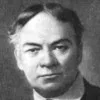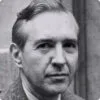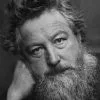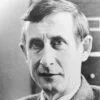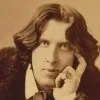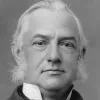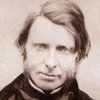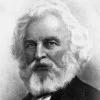You do what you must do, and pay for it. So in the end all things are simple.
Ellis Peters (1913-1995) English writer, translator [pseud. of Edith Mary Pargeter, who also wrote under the names John Redfern, Jolyon Carr, Peter Benedict]
Brother Cadfael’s Penance, ch. 16 (1994)
(Source)
Quotations about:
simplicity
Note not all quotations have been tagged, so Search may find additional quotes on this topic.
We need not power or splendor;
Wide hall or lordly dome;
The good, the true, the tender, —
These form the wealth of home.Sarah J. Hale (1788-1879) American writer, activist, magazine editor
“Home” (1830)
The provenance of this poem is unclear. It is often assigned to her Poems for Our Children (1830) (the original location of her "Mary Had a Little Lamb"), but does not appear there. That work is subtitled "Part First," but there is no indication that a second part was ever published.
The good and straightforward person should resemble one who stinks of goat, in the sense that whoever comes close will immediately sense him, whether they want to or not.
[τοιοῦτον ὅλως δεῖ τὸν ἁπλοῦν καὶ ἀγαθὸν εἶναι, οἶον γράσωνα, ἵνα ὁ παραστὰς ἅμα τῷ προσελθεῖν, θέλει οὐ θέλει, αἴσθηται.]
Marcus Aurelius (AD 121-180) Roman emperor (161-180), Stoic philosopher
Meditations [To Himself; Τὰ εἰς ἑαυτόν], Book 11, ch. 15 (11.15) [tr. Needleman/Piazza (2008)]
(Source)
(Source (Greek)). Alternate translations:Such must he be for all the world, that is truly simple and good, as he whose arm-holes are offensive, that whosoever stands by, as soon as ever he comes near him, may as it were smell him whether he will or no.
[tr. Casaubon (1634), 11.14]I would have Honesty so incorporated with the Constitution, so mixed up with the Blood and Spirits, that it should be discoverable by the Sences, and as easily distinguish'd as Rankness, or a strong Breath; so that a Man must be forced to find it out whether he would or no.
[tr. Collier (1701)]The man of simplicity and goodness should, in this, resemble such as have a disagreeable smell in their arm-pits; his disposition should be perceived by all who approach him, whether they will or not.
[tr. Hutcheson/Moor (1742)]A truly good and sincere man should be so palpably such, that no one could be a moment in his company or approach him, without being sensibly and necessarily convinced of it.*
*The expression in the original is rather coarse; which the translators have rather heightened than shorted as they might have done.
[tr. Graves (1792)]The man who is honest and good ought to be exactly like a man who smells strong, so that the bystander as soon as he comes near him must smell whether he choose or not.
[tr. Long (1862)]Goodness, true and simple, should be like musk, so redolent that, will-he nill-he, every one who draws near perceives its fragrance.
[tr. Rendall (1898)]The straightforward, good man should be like one of rank odour who can be recognised by the passer by as soon as he approaches, whether he will or no.
[tr. Hutcheson/Chrystal (1902)]The simple and good man should in fact be like a man who has a strong smell about him, so that, as soon as ever he comes near, his neighbour is, will-he nill-he, aware of it.
[tr. Haines (Loeb) (1916)]The simple and good man ought to be entirely such, like the unsavoury man, that those who stand by detect him at once, whether he will or not, as soon as he comes near.
[tr. Farquharson (1944)]Sincerity and goodness ought to have their own unmistakable odor, so that one who encounters this becomes straightaway aware of it despite himself.
[tr. Staniforth (1964)]A good and honest man should be so right through, like one who smells like a goat, so that anyone who comes near him is immediately aware of it whether he wishes it or not.
[tr. Hard (1997 ed.)]A straightforward, honest person should be like someone who stinks: when you're in the same room as them, you know it.
[tr. Hays (2003)]In short, the good and honest man should have the same effect as the unwashed -- anyone close by as he passes detects the aura, willy-nilly, at once.
[tr. Hammond (2006)]In short, a good and honest person should resemble one who smells like a goat in this respect, that anyone who comes near him is immediately aware of it whether he wishes it or not.
[tr. Hard (2011 ed.)]A person who is honest and good is immediately seen as such even by people who were not looking for any such assurance.
[tr. McNeill (2019)]
I think I could turn and live with animals, they are so placid and self-contain’d,
I stand and look at them long and long.
They do not sweat and whine about their condition,
They do not lie awake in the dark and weep for their sins,
They do not make me sick discussing their duty to God,
Not one is dissatisfied, not one is demented with the mania of owning things,
Not one kneels to another, nor to his kind that lived thousands of years ago,
Not one is respectable or unhappy over the whole earth.
Walt Whitman (1819-1892) American poet
Poem (1855), “Song of Myself,” sec. 32, l. 684ff, Leaves of Grass
(Source)
We humans, facing limits of knowledge, and things we do not observe, the unseen and the unknown, resolve the tension by squeezing life and the world into crisp commoditized ideas, reductive categories, specific vocabularies, and prepackaged narratives, which, on the occasion, has explosive consequences.
Nassim Nicholas Taleb (b. 1960) Lebanese-American essayist, statistician, risk analyst, aphorist
The Bed of Procrustes: Philosophical and Practical Aphorisms, Introduction (2010)
(Source)
Throw the lumber over, man! Let your boat of life be light, packed with only what you need — a homely home and simple pleasures, one or two friends, worth the name, someone to love and someone to love you, a cat, a dog, and a pipe or two, enough to eat and enough to wear, and a little more than enough to drink; for thirst is a dangerous thing.
Jerome K. Jerome (1859-1927) English writer, humorist [Jerome Klapka Jerome]
Three Men in a Boat (To Say Nothing of the Dog), ch. 3 (1889)
(Source)
The greatest artists have never been men of taste. By never sophisticating their instincts they have never lost the awareness of the great simplicities, which they relish both from appetite and from the challenge these offer to skill in competition with popular art.
Jacques Barzun (1907-2012) French-American historian, educator, polymath
Essay (1956), “Whirligig: Last Words on Berlioz,” The Energies of Art: Studies of Authors Classic and Modern,
(Source)
Update of an earlier, uncited essay.
A little House well fill’d, a little Field well till’d, and a little Wife well will’d, are great Riches.
Benjamin Franklin (1706-1790) American statesman, scientist, philosopher, aphorist
Poor Richard (1735 ed.)
(Source)
As with so many other proverbs, Franklin did not originate it, just presented it as Poor Richard's own.
The oldest version of this is handwritten (at the same time period) in a copy of the Grete Herball (1526), found by William Hazlitt in the late 19th C:A little house well filled,
A little land well tilled,
And a little wife well willed,
Are great riches.
It was likely known before then. Subsequent to that, a version was included by John Ray in his Compleat English Proverbs [Ray's Proverbs] (1670):A little house well fill'd,
a little land well till'd,
and a little wife well will'd.
It was later adapted by James Hook as "A little Farm well till'd," in the comic opera, The Soldier's Return (1805), the first lines of which read:A little Farm well tilled,
A little Cot well filled,
A little Wife well will'd,
Give me, give me.
I have never been in any rich man’s house which would not have looked the better for having a bonfire made outside of it of nine-tenths of all that it held.
William Morris (1834-1896) British textile designer, writer, socialist activist
“The Art of the People,” speech, Birmingham Society of Arts (1879-02-19)
(Source)
Any man with few needs appears a menace to the rich for he is always in a position to escape from them, and the tyrants see that thus they lose a slave.
[Tout homme qui a peu de besoins semble menacer les riches d’être toujours prêt à leur échapper. Les tyrans voient par là qu’ils perdent un esclave.]
Nicolas Chamfort (1741-1794) French writer, epigrammist (b. Nicolas-Sébastien Roch)
Products of Perfected Civilization [Produits de la Civilisation Perfectionée], Part 1 “Maxims and Thoughts [Maximes et Pensées],” ch. 3, ¶ 266 (1795) [tr. Mathers (1926)]
(Source)
(Source (French)). Alternate translations:Any man whose needs are few seems to threaten the rich with the possibility of his escaping them. Tyrants are thereby faced with the prospect of losing a slave.
[tr. Merwin (1969)]Any man who has few needs seems to threaten the rich with his readiness to escape from them. Thereby tyrants realize that they are losing a slave.
[tr. Pearson (1973)]Every man who has few needs seems to menace the wealthy with the constant threat of escaping from them. Tyrants see in such a proposition the loss of a slave.
[tr. Siniscalchi (1994)]Anyone whose needs are small seems threatening to the rich, because he's always ready to escape their control. This is how tyrants recognize that they're losing a slave.
[tr. Parmée (2003)]
A plain appearance is to ordinary men their proper garb: it suits them and fits them, but it adorns those persons whose lives have been distinguished by grand deeds; I compare them to a beauty who is most charming in négligé.
[Un extérieur simple est l’habit des hommes vulgaires, il est taillé pour eux et sur leur mesure; mais c’est une parure pour ceux qui ont rempli leur vie de grandes actions: je les compare à une beauté négligée, mais plus piquante.]
Jean de La Bruyère (1645-1696) French essayist, moralist
The Characters [Les Caractères], ch. 2 “Of Personal Merit [Du Mérite Personnel],” § 17 (2.17) (1688) [tr. Van Laun (1885)]
(Source)
(Source (French)). Alternate translations:That Simplicity of outward Appearance, which in vulgar Men seems to be their proper Clothes, shap'd and fitted to their Size, is the ornamental Habit of those Persons whose Lives have been full of great Actions. I compare 'em to a Beauty, that is more charming for being negligent.
[Curll ed. (1713)]A plain Exterior is to ordinary Men their proper Garb, shaped and fitted to their Size, but is an ornamental Habit in those Persons whose Lives have been distinguished by signal Actions. I compare them to a Beauty, most charming when à la negligé.
[Browne ed. (1752)]Outward simplicity befits ordinary men, like a garment made to measure for them; but it serves as an adornment to those who have filled their lives with great deeds: they might be compared to some beauty carelessly dressed and thereby all the more attractive.
[tr. Stewart (1970)]
Women have very simple tastes. They can get pleasure out of the conversation of children in arms and men in love.
H. L. Mencken (1880-1956) American writer and journalist [Henry Lewis Mencken]
A Little Book in C Major, ch. 1, § 17 (1916)
(Source)
Blest is the man who cheats the stormy sea
And safely moors beside the sheltering quay;
So, blest is he who triumphs over trial.
One man, by various means, in wealth or strength
Outdoes his neighbour; hope in a thousand hearts
Colours a thousand different dreams; at length
Some find a dear fulfilment, some denial.
But this I say,
That he who best
Enjoys each passing day
Is truly blest.[εὐδαίμων μὲν ὃς ἐκ θαλάσσας
ἔφυγε χεῖμα, λιμένα δ᾽ ἔκιχεν:
εὐδαίμων δ᾽ ὃς ὕπερθε μόχθων
ἐγένεθ᾽: ἑτέρᾳ δ᾽ ἕτερος ἕτερον
ὄλβῳ καὶ δυνάμει παρῆλθεν.
μυρίαι δ᾽ ἔτι μυρίοις
εἰσὶν ἐλπίδες: αἳ μὲν
τελευτῶσιν ἐν ὄλβῳ
βροτοῖς, αἳ δ᾽ ἀπέβησαν:
τὸ δὲ κατ᾽ ἦμαρ ὅτῳ βίοτος
εὐδαίμων, μακαρίζω.]Euripides (485?-406? BC) Greek tragic dramatist
Bacchæ [Βάκχαι], l. 902ff (Stasimon 3, Epode) [Chorus/Χορός] (405 BC) [tr. Vellacott (1973)]
(Source)
(Source (Greek)). Alternate translations:Blest is the man who 'scapes the stormy wave.
And in the harbour finds repose:
He too is blest, 'midst dangers brave,
Who soars above the malice of his foes:
And now these, now those possess
Superior talents or success;
Distinct their aims; but hope each bosom fires.
There are, a rich encrease who find,
The vows of some are scatter'd in the wind:
But in my judgement blest are they
Who taste, tho' only for the day.
The joys their soul desires.
[tr. Wodhull (1809)]Happy is he who has fled a storm on the sea, and reached harbor. Happy too is he who has overcome his hardships. One surpass another in different ways, in wealth or power. There are innumerable hopes to innumerable men, and some result in wealth to mortals, while others fail. But I call him blessed whose life is happy day today.
[tr. Buckley (1850)]Who hath 'scaped the turbulent sea,
And reached the haven, happy he!
Happy he whose toils are o'er
In the race of wealth and power!
This one her, and that one there,
Passes by, and everywhere
Still expectant thousands over
Thousands hopes are seen to hover,
Some to mortals end in bliss;
Some have already fled away:
Happiness alone is his
That happy is to-day.
[tr. Milman (1865)]Happy he, who from the storm,
Has the breaker escaped, and the harbour has reached;
Happy he who after toil
Is the victor, for many the ways in which man
Wins him power, and wins him wealth.
Thousand-fold ever to thousands of men,
Hope follows upon hope,
With some it grows unceasingly,
With some it wastes to nothingness.
But he whose life is ever fresh,
Lives in unbroken happiness.
[tr. Rogers (1872), l. 865ff.]Happy is he who hath escaped the wave from out the sea, and reached the haven; and happy he who hath triumphed o’er his troubles; though one surpasses another in wealth and power; yet there be myriad hopes for all the myriad minds; some end in happiness for man, and others come to naught; but him, whose life from day to day is blest, I deem a happy man.
[tr. Coleridge (1891)]Blest who from ravening seas
Hath 'scaped to haven-peace,
Blest who hath triumphed in endeavour's toil and throe.
This man to higher height
Attains, of wealth, of might,
Than that; yet myriad hopes in myriad hearts still glow:
To fair fruition brought
Are some, some come to nought:
Happy is he whose bliss from day to day doth grow.
[tr. Way (1898)]Happy he, on the weary sea
Who hath fled the tempest and won the haven.
Happy whoso hath risen, free,
Above his striving. For strangely graven
Is the orb of life, that one and another
In gold and power may outpass his brother.
And men in their millions float and flow
And seethe with a million hopes as leaven;
And they win their Will, or they miss their Will,
And the hopes are dead or are pined for still;
But whoe'er can know,
As the long days go,
That To Live is happy, hath found his Heaven!
[tr. Murray (1902)]-- Blessèd is he who escapes the storm at sea,
who comes home to his harbor.
-- Blessèd is he who emerges from under affliction.
-- In various ways one man outraces another in the race for wealth and power.
-- Ten thousand men possess ten thousand hopes.
-- A few bear fruit in happiness; the others go awry.
-- But he who garners day by day the good of life, he is happiest. Blessèd is he.
[tr. Arrowsmith (1960)]Happy the man who from the sea
escapes the storm and finds harbor;
happy he who has surmounted
toils; and in different ways one surpasses another
in prosperity and power.
Besides this, for countless men there are countless
hopes -- some of them
reach to the end in prosperity
for mortals, and others depart;
but him whose life day by day
is happy do I count blessed.
[tr. Kirk (1970)]Happy he from the sea escaping
out of the storm, arriving at anchorage;
happy he fleeing labour's straining;
in many manners may men surpass other men
in prosperity and in power.
Thousand-fold upon thousand-fold
hopes come crowding upon us,
and some finally prosper
for mortals, some are vanish'd:
who day by day has a livelihood of happiness, he is blessed
[tr. Neuburg (1988)]Happy the man who withstands
life's assaults.
Somehow, in some way, some man surpasses some other
in position and fortune.
For millions of men there are millions of hopes.
For some, these ripen into happiness,
for others into nothing.
Count lucky the man who is happy on this one day.
[tr. Cacoyannis (1982)]That man is blessed who fled the storm
At sea and reached the bay.
And he is blessed who rose above
His toil. In various ways
One man outstrips in wealth and power
Another: countless men
Have countless hopes: some end in joy,
But others drift way.
The man who day to day has luck
In life -- that man I bless.
[tr. Blessington (1993)]Happy the man who escapes
the storm at sea and reaches harbor.
Happy, too, is he who overcomes
his toils. And in different ways one man
surpasses another in prosperity and power.
Besides, countless are the hopes
of countless men, Some of those hopes
end in prosperity for mortals, others vanish.
But I count him blessed whose life,
from day to day, is happy.
[tr. Esposito (1998)]Happy the man who has come away
safe on the beach from a storm at sea,
happy the man who has risen above
trouble and toil. Many are the ways
one man may surpass another
in wealth or power,
and beyond each hope there beckons another
hope without number.
Hope may lead a man to wealth,
hope may pass away;
but I admire a man when he
is happy in an ordinary life.
[tr. Woodruff (1999)]Happy is he who escapes
A storm at sea and finds safe harbor.
Happy is he who has risen above
Great toils. In different ways,
Some persons outdo others
In their wealth and power.
And hopes are as many as those who hope --
Some will end in rich reward, others in nothing.
But those whose lives are happy
Day by day -- those
I call the blesséd.
[tr. Gibbons/Segal (2000)]Blessed is he that out of the sea
escapes the storm and wins the harbor;
blessed he who triumphs over
trouble: one man surpasses another
in respect to wealth or power.
Furthermore, in countless hearts
there live countless hopes, some
ending in good fortune,
though some vanish away.
But the man whose life today is happy,
him I count blessed.
[tr. Kovacs (2002)]Joy of the storm endured,
And the harbour safely reached.
Joy of hardship overcome.
Joy of striving for wealth and power.
Joy of hope. Joy of dreams,
Fulfilled or unfulfilled.
And most blessed they who takes their joy
In the simple detail of the day by day --
[tr. Teevan (2002)]Happy is the man who has escaped the storms of life’s angry seas and found a harbour; and happy is the man who have endured those storms.
Men are infinite in number and their hopes have no end and some of these hopes bring joy to some and nothing to others.
I say blessed is the man whose life has been happy -- so far.
These are useful pieces of advice. True wisdom.
[tr. Theodoridis (2005)]Blessed is the one who's fled the
Storm at sea and come to harbour;
And happy is he who rises above
Hardships; for one may sur-
Pass another in wealth or in power,
But these are a lot hopes to a lot of
Different people; and many end in
Happiness while others fail mis’rably
But the one who's happy day-to-day,
Is the one who's truly blessed.
[tr. Valerie (2005)]Whoever has escaped a storm at sea
is a happy man in harbour,
whoever overcomes great hardship
is likewise another happy man.
Various men outdo each other
in wealth, in power,
in all sorts of ways.
The hopes of countless men
are infinite in number.
Some make men rich;
some come to nothing,
So I consider that man blessed
who lives a happy life
existing day by day.
[tr. Johnston (2008), l. 1106ff]Lucky is the man who escapes a storm at sea
and finds his way home to safe harbour --
the man delivered from hardship.
We all compete for wealth and power,
and for every thousand hearts a thousand hopes.
Some wither, some bear fruit.
But the one who lives from day to day,
finding good where he can:
he is happy --
he is a lucky man.
[tr. Robertson (2014)]Fortunate is the one who flees
The swell of the sea and returns to harbor.
Fortunate is the one who survives through troubles.
One is greater than another in different things,
He surpasses in fortune and power --
But in numberless hearts still
Are numberless hopes: some result
In good fortune, but other mortal dreams
Just disappear.
Whoever has a happy life to-day,
I consider fortunate.
[tr. @sentantiq (2018)]Happy is the one who escapes a sea-storm
and comes home to the harbor.
And happy is the one who stands against their hardships.
Happy are they who endure.
One man may exceed another, in his own way.
In wealth.
In power.
Countless hopes for yet-more-countless people.
Sometimes hope wins out, gives us riches --
And sometimes it doesn’t. Sometimes we fail.
But the one who can live in spite of this,
who is happy day to day.
That one is blessed.
[tr. Pauly (2019)]Blessed is the one who finds a harbour safe from the winter sea. Blessed is the one who travels beyond affliction. Blessed is the one who wins great joy. Numberless more have their dreams. Some hopes are fulfilled, some vanish. Whoever lives happily from day to day I bless.
[tr. Behr/Foster (2019)]Fortunate [eudaimōn] is he who has fled a storm on the sea and reached harbor. Eudaimōn too is he who has overcome his toils. Different people surpass others in various ways, be it in wealth [olbos] or in power. Mortals have innumerable hopes, and some come to telos in prosperity [olbos], while others fail. I deem him blessed whose life is eudaimōn day by day.
[tr. Buckley/Sens/Nagy (2020)]
Clean, quick, and easy as lying. We know how it ends practically before it starts. That’s why stories appeal to us. They give us the clarity and simplicity our real lives lack.
Patrick Rothfuss (b. 1973) American author
The Name of the Wind, ch. 45 “Interlude — Some Tavern Tale” [Kvothe] (2007)
(Source)
Animals never spend time dividing experience into little bits and speculating about all the bits they’ve missed. The whole panoply of the universe has been neatly expressed to them as things to (a) mate with, (b) eat, (c) run away from, and (d) rocks. This frees the mind from unnecessary thoughts and gives it a cutting edge where it matters.
Terry Pratchett (1948-2015) English author
Equal Rites (1987)
(Source)
Frequently paraphrased:The entire universe has been neatly divided into things to (a) mate with, (b) eat, (c) run away from, and (d) rocks.
The technologies which have had the most profound effects on human life are usually simple. A good example of a simple technology with profound historical consequences is hay. Nobody knows who invented hay, the idea of cutting grass in the autumn and storing it in large enough quantities to keep horses and cows alive through the winter. All we know is that the technology of hay was unknown to the Roman Empire but was known to every village of medieval Europe. Like many other crucially important technologies, hay emerged anonymously during the so-called Dark Ages. According to the Hay Theory of History, the invention of hay was the decisive event which moved the center of gravity of urban civilization from the Mediterranean basin to Northern and Western Europe. The Roman Empire did not need hay because in a Mediterranean climate the grass grows well enough in winter for animals to graze. North of the Alps, great cities dependent on horses and oxen for motive power could not exist without hay. So it was hay that allowed populations to grow and civilizations to flourish among the forests of Northern Europe. Hay moved the greatness of Rome to Paris and London, and later to Berlin and Moscow and New York.
I have the simplest tastes. I am always satisfied with the best.
Oscar Wilde (1854-1900) Irish poet, wit, dramatist
(Attributed)
(Source)
Quoted in Edgar Saltus, Oscar Wilde: An Idler's Impression (1917), as a comment made to him by Wilde.
Also attributed to Winston Churchill, with less foundation.
For more discussion about this quotation: I Have the Simplest Tastes; I Am Always Satisfied with the Best – Quote Investigator.
Simplicity is the final achievement. After one has conquered all the difficulties, after one has played a vast quantity of notes and more notes, it is simplicity that emerges in all its charm as the crowning reward of art. Whoever wants to obtain this immediately will never achieve it: you can’t begin with the end. One has to have studied a lot, tremendously, to reach this goal; it’s no easy matter.
[La dernière chose c’est la simplicité. Après avoir épuisé toutes les difficultés, après avoir joué une immense quantité de notes, et de notes, c’est la simplicité qui sort avec tout son charme, comme le dernier sceau de l’art. Quiconque veut arriver de suite à cela n’y parviendra jamais, on ne peut commencer par la fin. II faut avoir étudié beaucoup, mème immensement pour atteindre ce but, ce n’est pas une chose facile.]
Frédéric Chopin (1810-1849) Polish composer and pianist
In the diary of Friederike Streicher (née Müller) (1840-04-21)
(Source)
When told by Müller that what impressed her most about Franz Liszt's playing was his "calmness in overcoming the greatest technical difficulties." Müller was a premiere student of Chopin, 1839-41. Excerpts from her diary are printed in Frederick Niecks, Frederick Chopin: As A Man and Musician, Vol. 2, Appendix 3 (1888).
Have you ever noticed that there are no Maytag user groups? Nobody needs a mutual support group to run a washing machine. You just put the clothes in, punch the button, and they get clean. To do information processing, I don’t want hardware and software; what I really want is an appliance to do my tasks.
Jef Raskin (1943-2005) American computer scientist, writer
Interview in Susan Lammers, Programmers At Work (1986)
(Source)
Our lives get complicated because complexity is so much simpler than simplicity.
James Richardson (b. 1950) American poet
“Vectors: 56 Aphorisms and Ten-second Essays,” Michigan Quarterly Review, # 7 (Spring 1999)
(Source)
If people do not believe that mathematics is simple, it is only because they do not realize how complicated life is.
John von Neumann (1903-1957) Hungarian-American mathematician, physicist, inventor, polymath [János "Johann" Lajos Neumann]
Speech, Association for Computing Machinery inaugural conference, Columbia University, New York (15 Sep 1947)
(Source)
Von Neumann insisted that ENIAC's command language could encompass all mathematics, given how only a thousand words could handle most needs of life, and mathematics was, he insisted, simpler than life. When the audience laughed, he replied with this comment. Quoted in Franz L. Alt, "Archaeology of computers: Reminiscences, 1945-1947," Communications of the ACM, Vol 15, #7 (Jul 1972).
“And sin, young man, is when you treat people like things. Including yourself. That’s what sin is.”
“It’s a lot more complicated than that –”
“No. It ain’t. When people say things are a lot more complicated than that, they means they’re getting worried that they won’t like the truth. People as things, that’s where it starts.”
“Oh, I’m sure there are worse crimes –”
“But they starts with thinking about people as things …”Terry Pratchett (1948-2015) English author
Carpe Jugulum [Granny Weatherwax, Rev. Mightily Oats] (1998)
(Source)
I believe that no endeavor that is worthwhile is simple in prospect; if it is right, it will be simple in retrospect.
Edward Teller (1908-2003) Hungarian-American theoretical physicist
Quoted by Judith Shoolery, personal communication (2004)
(Source)
Quoted in István Hargittai, The Martians of Science: Five Physicists Who Changed the Twentieth Century (2006).
Physics is, hopefully, simple. Physicists are not.
Edward Teller (1908-2003) Hungarian-American theoretical physicist
Conversations on the Dark Secrets of Physics, ch. 10 (1991) [with Wendy Teller and Wilson Talley]
(Source)
Broadly speaking, short words are best, and the old words, when short, are the best of all.
Winston Churchill (1874-1965) British statesman and author
The Times Literary Award luncheon, London (2 Nov 1949)
(Source)
Beauty is an ecstasy; it is as simple as hunger. There is really nothing to be said about it. It is like the perfume of a rose: you can smell it and that is all.
W. Somerset Maugham (1874-1965) English novelist and playwright [William Somerset Maugham]
Cakes and Ale, ch. 11 (1930)
(Source)
Above all, the search after truth and its eager pursuit are peculiar to man. And so, when we have leisure from the demands of business cares, we are eager to see, to hear, to learn something new, and we esteem a desire to know the secrets or wonders of creation as indispensable to a happy life. Thus we come to understand that what is true, simple, and genuine appeals most strongly to a man’s nature.
[In primisque hominis est propria veri inquisitio atque investigatio. Itaque cum sumus necessariis negotiis curisque vacui, tum avemus aliquid videre, audire, addiscere cognitionemque rerum aut occultarum aut admirabilium ad beate vivendum necessarian! ducimus. Ex quo intellegitur, quod verum, simplex sincerumque sit, id esse naturae hominis aptissimum.]
Marcus Tullius Cicero (106-43 BC) Roman orator, statesman, philosopher
De Officiis [On Duties; On Moral Duty; The Offices], Book 1, ch. 4 (1.4) / sec. 13 (44 BC) [tr. Miller (1913)]
(Source)
Original Latin. Alt. trans.:But of all the properties and inclinations of men, there is none more natural and peculiar to them than an earnest desire and search after truth. Hence it is that our minds are no sooner free from the thoughts and engagements of necessary business, but we presently long to be either seeing, or hearing, or learning of something; and esteem the knowledge of things secret and wonderful as a necessary ingredient of a happy life. Whence it appears that nothing is more agreeable and suited to the nature and minds of men than undisguised openness, truth, and sincerity.
[tr. Cockman (1699)]The desire and investigation of truth is proper to man. When disengaged from necessary business and cares, we are eager to add to our knowledge by examining for ourselves or listening to others. The discovery of what is secret or wonderful, we are disposed to conceive essential to happiness. Hence, what is true, simple, and undisguised, is best adapted to human nature.
[tr. McCartney (1798)]Before all other things, man is distinguished by his pursuit and investigation of TRUTH. And hence, when free from needful business and cares, we delight to see, to hear, and to communicate, and consider a knowledge of many admirable and abstruse things necessary to the good conduct and happiness of our lives: whence it is clear that whatsoever is TRUE, simple, and direct, the same is most congenial to our nature as men.
[In John Frederick William Herschel, A Preliminary Discourse on the Study of Natural Philosophy, Epigraph (1830)]The distinguishing property of man is to search for and to follow after truth. Therefore, when relaxed from our necessary cares and concerns, we then covet to see, to hear, and to learn somewhat; and we esteem knowledge of things either obscure or wonderful to be the indispensable means of living happily. From this we understand that truth, simplicity, and candour, are most agreeable to the nature of mankind.
[tr. Edmonds (1865)]The research and investigation of truth, also, are a special property of man. Thus, when we are free from necessary occupations, we want to see, or hear, or learn something, and regard the knowledge of things either secret or wonderful as essential to our living happily and well.
[tr. Peabody (1883)]The distinctive faculty of man is his eager desire to investigate the truth. Thus, when free from pressing duties and cares, we are eager to see or hear, or learn something new, and we think our happiness is incomplete unless we study the mysteries and the marvels of the universe.
[tr. Gardiner (1899)]The first duty of man is the seeking after and the investigation of truth.
[ed. Harbottle (1906)Inquiry into and searching for truth are primary characteristics of mankind. So when we are free from business obligations and other preoccupations, we become eager to see something new, to hear and learn something; we begin to think that knowledge about the mysteries and wonders of the world is necessary to a happy life.
[tr. Edinger (1974)]
To my mind, simplicity is the keynote of all true elegance.
It is necessary that we too should see the beam in our own eyes, and learn to distinguish between the Christianity of the nineteenth century and the religion of Christ. If we find that the Christianity of the nineteenth century does not win as many hearts in India and China as it ought, let us remember that it was the Christianity of the first century in all its dogmatic simplicity, but with its overpowering love of God and man, that conquered the world and superseded religions and philosophies, more difficult to conquer than the religious and philosophical systems of Hindus and Buddhists.
Max Müller (1823-1900) German-British philologist, Orientalist, religious studies founder
Chips from a German Workshop, Preface (1866)
(Source)
Code is like humor. When you have to explain it, it’s bad.
The supreme crime of the church to-day is that everywhere and in all its operations and influences it is on the side of sloth of mind; that it banishes brains, it sanctifies stupidity, it canonizes incompetence.
Upton Sinclair (1878-1968) American writer, journalist, activist, politician
The Profits of Religion, Book Two: “The Church of Good Society,” “The Canonization of Incompetence” (1917)
(Source)
Simplicity of life, even the barest, is not a misery, but the very foundation of refinement: a sanded floor and whitewashed walls, and the green trees, and flowery meads, and living waters outside; or a grimy palace amid the smoke with a regiment of housemaids always working to smear the dirt together so that it may be unnoticed; which, think you, is the most refined, the most fit for a gentleman of those two dwellings?
William Morris (1834-1896) British textile designer, writer, socialist activist
“The Prospects of Architecture in Civilization,” speech, London (10 Mar 1880)
(Source)
A lot of this was beyond him, but to people like Ridcully this didn’t matter for very long. Ridcully was simple-minded. This doesn’t mean stupid. It just meant that he could only think properly about things if he cut away all the complicated bits around the edges.
What do you suppose makes all men look back to the time of childhood with so much regret (if their childhood has been, in any moderate degree, healthy or peaceful)? That rich charm, which the least possession had for us, was in consequence of the poorness of our treasures. That miraculous aspect of the nature around us, was because we had seen little, and knew less. Each increased possession loads us with a new weariness; every piece of new knowledge diminishes the faculty of admiration; and Death is at last appointed to take us from a scene in which, if we were to stay longer, no gift could satisfy us, and no miracle surprise.
John Ruskin (1819-1900) English art critic, painter, writer, social thinker
The Eagle’s Nest, Lecture 5 “The Power of Contentment in Science and Art,” Sec. 82 (22 Feb 1872)
(Source)
The wisest man could ask no more of Fate
Than to be simple, modest, manly, true,
Safe from the Many, honored by the Few;
To count as naught in World, or Church, or State,
But inwardly in secret to be great.James Russell Lowell (1819-1891) American diplomat, essayist, poet
“Jeffries Wyman,” The Nation #484 (8 Oct 1874)
(Source)
In character, in manners, in style, in all things, the supreme excellence is simplicity.
“Simple things are never problems,” I told her. “Unfortunate, maybe, but if it isn’t complicated, it isn’t really a problem.”
The Goddess nodded. “Very good, Vlad; I didn’t expect such wisdom from you.”
I grunted and didn’t tell her I was quoting my grandfather; I’d rather she stayed impressed.
In scientific thought we adopt the simplest theory which will explain all the facts under consideration and enable us to predict new facts of the same kind. The catch in this criterion lies in the word “simplest.” It is really an aesthetic canon such as we find implicit in our criticisms of poetry or painting.
J.B.S. Haldane (1892-1964) English geneticist [John Burden Sanderson Haldane]
“Science and Theology as Art Forms,” Possible Worlds and Other Papers (1927)
(Source)
A good style should show no signs of effort. What is written should seem a happy accident.
W. Somerset Maugham (1874-1965) English novelist and playwright [William Somerset Maugham]
The Summing Up, ch. 13 (1938)
(Source)
Do keep a thesaurus, but in the shed at the back of the garden or behind the fridge, somewhere that demands travel or effort. Chances are the words that come into your head will do fine, e.g., “horse”, “ran”, “said”.
Roddy Doyle (b. 1958) Irish novelist, dramatist, screenwriter
In “Ten Rules for Writing Fiction,” The Guardian (20 Feb 2010)
(Source)
There is more in you of good than you know, child of the kindly West. Some courage and some wisdom, blended in measure. If more of us valued food and cheer and song above hoarded gold, it would be a merrier world.
J.R.R. Tolkien (1892-1973) English writer, fabulist, philologist, academic [John Ronald Reuel Tolkien]
The Hobbit, ch. 18 “The Return Journey” [Thorin] (1937)
(Source)
The only simplicity for which I would give a straw is that which is on the other side of the complex — not that which never has divined it.
Oliver Wendell Holmes, Jr. (1841-1935) American jurist, Supreme Court Justice
Letter (1902-10-24) to Lady Georgina Deffell Pollock
(Source)
In context, criticizing those who praise simplicity (at least in literature, if not beyond), except that simplicity which results after a synthesis of the complex.
Collected in Mark Howe (ed.), Holmes-Pollock Letters: The Correspondence of Mr. Justice Holmes and Sir Frederick Pollock, 1874-1932 (1961).
This quotation is frequently misattributed to his father, Oliver Wendell Holmes, Sr. It also has (at least two) incorrect variants that are seen more frequently on the Internet:For the simplicity on this side of complexity, I wouldn't give you a fig. But for the simplicity on the other side of complexity, for that I would give you anything I have.I wouldn’t give a fig for the simplicity on this side of complexity; I would give my right arm for the simplicity on the far side of complexity.
He was a one-book man. Some men have only one book in them; others, a library.
Sydney Smith (1771-1845) English clergyman, essayist, wit
Memoir of the Reverend Sydney Smith, by His Daughter, Lady Holland, Vol. 1, ch. 11 (1855)
(Source)
The inexperienced, and crackpots, and people like that, make guesses that are simple, but you can immediately see that they are wrong, so that does not count. Others, the inexperienced students, make guesses that are very complicated, and it sort of looks as if it is all right, but I know it is not true because the truth always turns out to be simpler than you thought.
Richard Feynman (1918-1988) American physicist
The Character of Physical Law, ch 7 “Seeking New Laws” (1965)
(Source)
G’KAR: By G’Quon I can’t recall the last time I was in a fight like that! No moral ambiguity, no hopeless battle against ancient and overwhelming forces. They were the bad guys, as you say, and we were the good guys! And they made a very satisfying thump when they hit the floor!
Simple pleasures are the last refuge of the complex.






